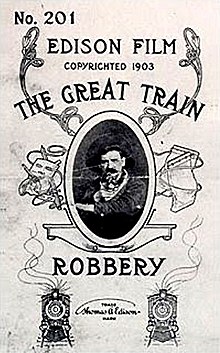
Back The Great Train Robbery (cinta de 1903) AN سرقة القطار الكبرى (فيلم) Arabic The Great Train Robbery AST The Great Train Robbery (pel·lícula de 1903) Catalan Velká železniční loupež Czech Пуйăса пысăккăн çаратни (фильм, 1903) CV Det store togrøveri Danish Der große Eisenbahnraub (1903) German La Granda Trajna Rabo (filmo) Esperanto Asalto y robo de un tren Spanish
| The Great Train Robbery | |
|---|---|
 Cover of a promotional leaflet for the film | |
| Directed by | Edwin S. Porter |
| Based on | The Great Train Robbery by Scott Marble |
| Starring | Justus D. Barnes G. M. Anderson Walter Cameron |
| Cinematography | Edwin S. Porter J. Blair Smith |
| Distributed by | Edison Manufacturing Company |
Release date |
|
Running time |
|
| Country | United States |
| Languages | Silent English intertitles |
The Great Train Robbery is a 1903 American silent film made by Edwin S. Porter for the Edison Manufacturing Company. It follows a gang of outlaws who hold up and rob a steam locomotive at a station in the American West, flee across mountainous terrain, and are finally defeated by a posse of locals. The short film draws on many sources, including a robust existing tradition of Western films, recent European innovations in film technique, the play of the same name by Scott Marble, the popularity of train-themed films, and possibly real-life incidents involving outlaws such as Butch Cassidy.
Porter supervised and photographed the film in New York and New Jersey in November 1903; the Edison studio began selling it to vaudeville houses and other venues in the following month. The cast included Justus D. Barnes and G. M. Anderson, who may have also helped with planning and staging. Porter's storytelling approach, though not particularly innovative or unusual for 1903, allowed him to include many popular techniques of the time, including scenes staged in wide shots, a matte effect, and an attempt to indicate simultaneous action across multiple scenes. Camera pans, location shooting, and moments of violent action helped give The Great Train Robbery a sense of rough-edged immediacy. A special close-up shot, which was unconnected to the story and could either begin or end the film depending on the projectionist's whim, showed Barnes, as the outlaw leader, emptying his gun directly into the camera.
Due in part to its popular and accessible subject matter, as well as to its dynamic action and violence, The Great Train Robbery was an unprecedented commercial success. Though it did not significantly influence or advance the Western film genre, it was widely distributed and copied, including in a parody by Porter himself. During the twentieth century, inaccurate legends about The Great Train Robbery developed, claiming it was the first Western or even the first film to tell a story. Film scholars have repeatedly disproved these claims, demonstrating that The Great Train Robbery was a stylistic dead-end for its maker and genre; its commercial success and mythic place in American film lore nonetheless remain undisputed. The film, especially the close-up of Barnes, has become iconic in American culture, appearing in numerous film and television references and homages. In 1990, The Great Train Robbery was selected for preservation in the United States National Film Registry by the Library of Congress as being "culturally, historically, or aesthetically significant".
© MMXXIII Rich X Search. We shall prevail. All rights reserved. Rich X Search